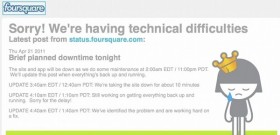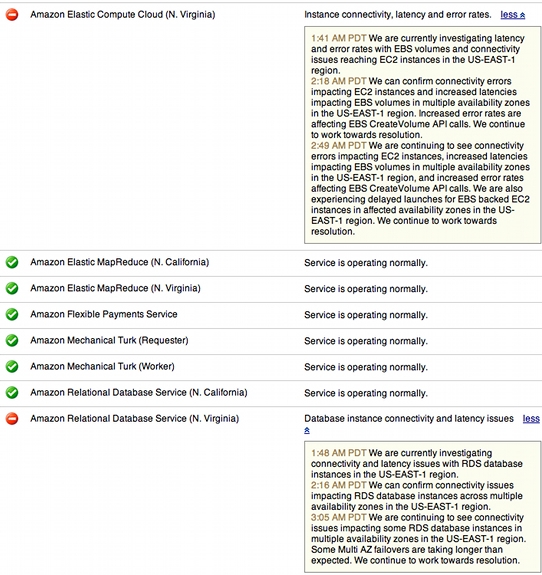Gevaar van afhankelijkheid van de cloud

Werken in de cloud wordt alom geprezen. Data in de cloud is overal toegankelijk met elk apparaat. De keerzijde van werken in de cloud werd gisteren duidelijk toen “Amazon EC2”, een van de servers van Amazon Webservices, het begaf. Op de servers van Amazon zijn vele populaire webservices aanwezig: o.a. Foursquare, Quora, Reddit, Moby en Hootsuite. Een groot gedeelte van deze services was vandaag niet toegankelijk voor de gebruikers, zie de verschillende meldingen.
Op de server status pagina van Amazon Webservices was vanmiddag een log te zien van de storingen in de Amazon Elastic Compute Cloud, Amazon Relational Database Service en de Amazon Elastic Beanstalk server.

Verder meldt Amazon:
We can confirm connectivity errors impacting EC2 instances and increased latencies impacting EBS volumes in multiple availability zones in the US-EAST-1 region. Increased error rates are affecting EBS CreateVolume API calls. We continue to work towards resolution
De storing is een van de meest heftige die Amazon heeft gekend. In 2008 ging het ook al eens fout bij een server van Amazon. Toen was een server 2 keer in 2 maanden down. Amazon Webservices is populair bij tech startups vanwege het “variable pricing model”.
Afhankelijkheid
De storing legt een van de nadelen van cloud computing bloot. Als een server eruit knalt is dat normaal een lokaal probleem binnen een bedrijf. Bij werken in de cloud ben je afhankelijk van de servers van een externe partij. In 2008 zorgde een storing bij Google Apps ervoor dat tig bedrijven niet bij hun email konden. Elke extra partij is een extra schakel waarin iets mis kan gaan. Denk hierbij bijvoorbeeld aan de afhankelijk van de netwerkverbinding. Een grote storing zoals vorig jaar bij KPN kan er voor zorgen dat je ook niet meer bij je bestanden kan. Bij services waar files alleen in de cloud gehost worden ben je als gebruiker volledig afhankelijk van de bewuste service. Bij een storing op de schaal van wat zich gisteren voordeed kan het er voor zorgen dat gehele bedrijven worden platgelegd.
Voor alle voor- en nadelen van cloud computing zie dit artikel op Nu.

Het was niet één server die stuk ging gister, maar een gehele service die gister problemen veroorzaakte. De virtuele harde schijven (EBS) van de virtuele servers (EC2) werkten niet naar behoren. Er traden eerst enorme vertragingen op in het lezen en schrijven, waarna disks daadwerkelijk begonnen uit te vallen. Wat er precies gebeurt is, is erg technisch en ook voor mij nog niet 100% helder. ‘Gelukkig’ was het alleen de US-EAST-1 region die problemen ondervond.
Het klopt dat je bij werken met de Cloud heel erg afhankelijk bent van de externe partij en vaak machteloos bent over het traject bij een storing. Aan de andere kant leveren Clouds als die van Amazon ook een dusdanig level van redundancy die je zelf bijna niet kan bereiken als klein of MKB bedrijf. Als je echter je IT beheer uitbesteed zit je met dezelfde problemen als met werken in de Cloud.
Bij Sugababes.nl draaiden wij onze eigen hardware en om heel eerlijk te zijn hadden we daar meer last van hardware storingen dan dat wij die nu met Mobypicture bij Amazon hebben. Sinds 2009 waar in korte tijd als ik het mij goed herinner er EC2 en S3 problemen optraden hebben we geen problemen meegemaakt. Volgens mij zelfs niet het uitvallen van 1 enkele instance door storingen. Dat is best een aardige uptime
Everything has its risks. Local storage has problems too, not least in rising energy costs and maintaining hardware. Do small companies really have an alternative? depends. for storage of your own data (like client databases) I see that LaCie has started a European equivalent of dropbox called Wuala. But for services to the public , the cloud can cope with peaks for a price that you can’t do alone. Will it every go down? Yes, there may be times when it doesn’t work. Google and Amazon seem to cleverer than European companies in standardising their hardware, putting the servers in containers and buying disused or run down places in areas with reliaable electricity. Broadcast.com originally put their servers in the lift shafts of car parks in Dallas – i.e. spaces that were otherwise useless and therefore cheap.
I agree with Jonathan that everything has its risks, however this issue could have been avoided. Most companies are always looking at lowering their operational expendatures, one of the first things that are ceing cut off or not being imlemented are fail over systems.
There are software packages available that monitor the services and automatically switch to the fail over system when the production server fails and even switches to a DR location when available and configured.
Agree Timan, Jonathan and Vincent. The view of the article is ofcourse slightly unsubtle. In my opinion, there’s a bigger development which strengthen the fear of downtimes as happened yesterday. As technology evolves, it increasingly takes over tasks we used to do manually; i.e. we give up a bit of control and we gain new possibilities. As such, I strongly believe that cloud computing will gain more popularity. Although it has it’s disadvantages, it will be the way to opt for. These downtimes remind us of the fact that we’ve lost the physical control over the hardware/servers, however, thinking rationally, servers may break down anywhere. Moreover, when it occurs, it’s maybe for the best that it occurs at an organization specialized in these servers.
Suppose you’re an airline where one day out of business may put you out of business permanently. In other words: business critical applications and the Cloud are no happy marriage. Over the past months I already came across a couple of Cloud evangelists who had to give in that the Cloud is not the land of make believe in every situation. Spend your bucks wisely.
Just returned to a visit from a great voice over guy in New York. He uses the cloud as the main storage solution, backing up the last week of stuff to hardware. He’s built a modular approach so if a computer or mixing desk goes down, the replacement just slots in its place. No budget for a support engineer. So I agree with Gerben that it depends on what’s mission critical. The good news is that these services exist. Couldn’t run my business without it